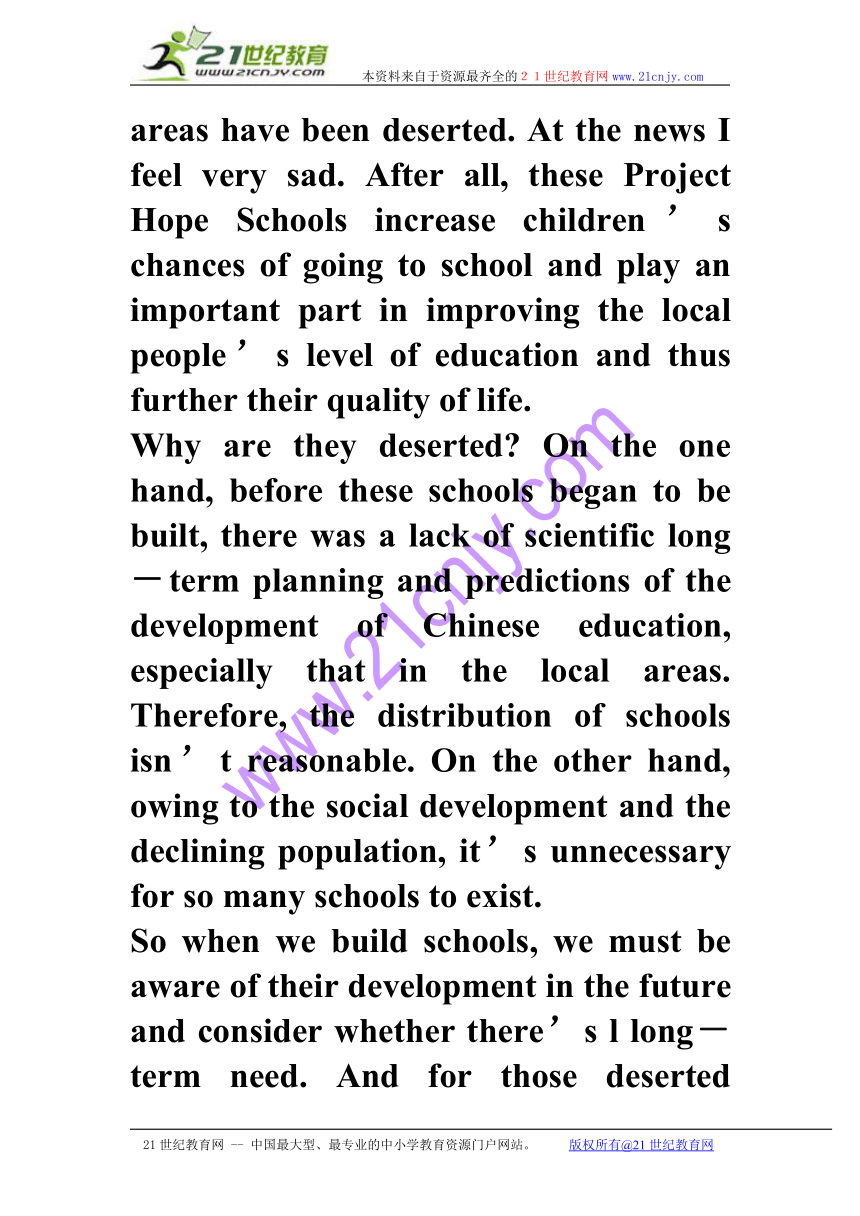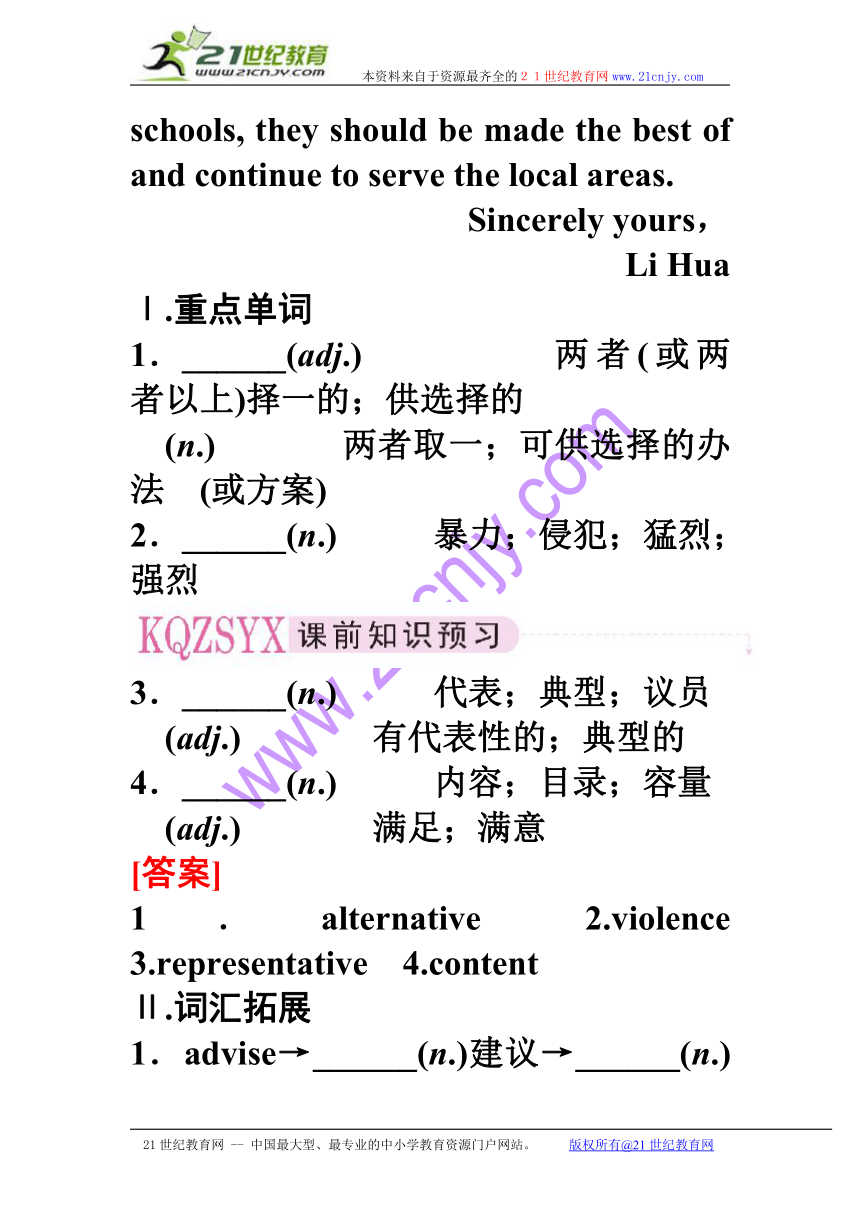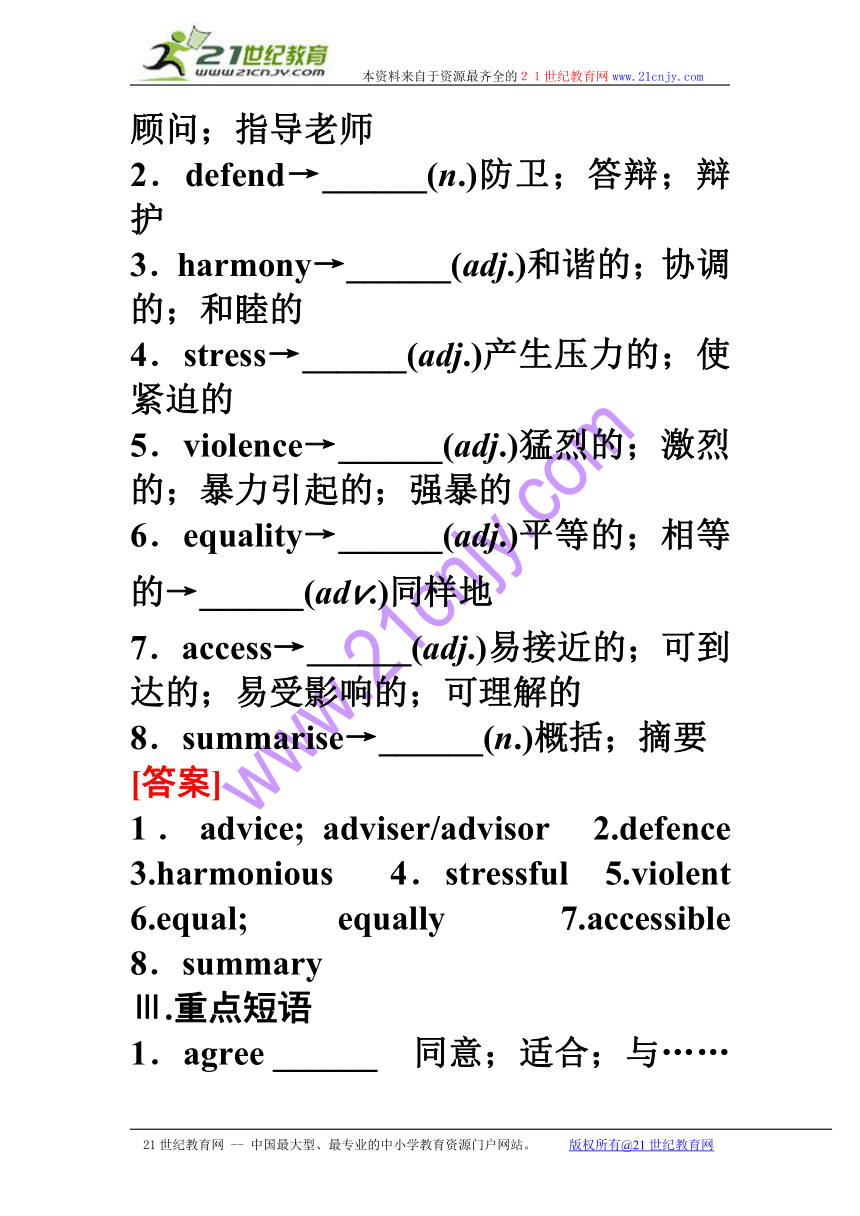备考2011高效学习方案英语高二册:unit 9 saving the earth
文档属性
| 名称 | 备考2011高效学习方案英语高二册:unit 9 saving the earth |

|
|
| 格式 | rar | ||
| 文件大小 | 164.7KB | ||
| 资源类型 | 教案 | ||
| 版本资源 | 人教版 | ||
| 科目 | 英语 | ||
| 更新时间 | 2010-12-14 00:00:00 | ||
图片预览





文档简介
本资料来自于资源最齐全的21世纪教育网www.21cnjy.com
Unit 9 Saving the earth
(2009·临沂一模)
假如你的名字是李华,最近你听到有关我国部分地区许多希望学校被荒废的新闻报道后,很是伤心。于是,你决定向一家英文报社写一封信,表达你的看法,内容包括:
◆希望学校对我国教育的贡献;
◆荒废的原因:缺乏规划和预测、社会的发展变化等;
◆如何处理荒废的学校。
注意:1.词数120—150;
2.可以适当增加细节,以使行文连贯充实;
3.文章的开头与结尾已经给出(不包括在词数内)。
Dear Sir/Madam,
Recently I have heard about some news that many Project Hope Schools in many areas have been deserted.
________________________________________________________________________
________________________________________________________________________
Sincerely yours,
Li Hua
[参考答案]
Dear Sir/Madam,
Recently I have heard about some news that many Project Hope Schools in some areas have been deserted. At the news I feel very sad. After all, these Project Hope Schools increase children’s chances of going to school and play an important part in improving the local people’s level of education and thus further their quality of life.
Why are they deserted On the one hand, before these schools began to be built, there was a lack of scientific long-term planning and predictions of the development of Chinese education, especially that in the local areas. Therefore, the distribution of schools isn’t reasonable. On the other hand, owing to the social development and the declining population, it’s unnecessary for so many schools to exist.
So when we build schools, we must be aware of their development in the future and consider whether there’s l long-term need. And for those deserted schools, they should be made the best of and continue to serve the local areas.
Sincerely yours,
Li Hua
Ⅰ.重点单词
1.______(adj.) 两者(或两者以上)择一的;供选择的
(n.) 两者取一;可供选择的办法 (或方案)
2.______(n.) 暴力;侵犯;猛烈;强烈
3.______(n.) 代表;典型;议员
(adj.) 有代表性的;典型的
4.______(n.) 内容;目录;容量
(adj.) 满足;满意
[答案]
1.alternative 2.violence 3.representative 4.content
Ⅱ.词汇拓展
1.advise→______(n.)建议→______(n.)顾问;指导老师
2.defend→______(n.)防卫;答辩;辩护
3.harmony→______(adj.)和谐的;协调的;和睦的
4.stress→______(adj.)产生压力的;使紧迫的
5.violence→______(adj.)猛烈的;激烈的;暴力引起的;强暴的
6.equality→______(adj.)平等的;相等的→______(adv.)同样地
7.access→______(adj.)易接近的;可到达的;易受影响的;可理解的
8.summarise→______(n.)概括;摘要
[答案]
1.advice; adviser/advisor 2.defence 3.harmonious 4.stressful 5.violent 6.equal; equally 7.accessible 8.summary
Ⅲ.重点短语
1.agree ______ 同意;适合;与……相一致
2.give a ______ 作演讲;作报告
3.______ a conclusion 得出结论
4.put an end ______ 结束
5.key ______ ……的关键
6.in ______ with 与……协调一致
7.wipe ______ 消灭
8.make a ______ 有影响
9.make a ______ 改变
10.take ______ in 参加
11.______ action 采取行动
12.have a ______ towards 对……负有责任
13.______ to 取得权利
14.______ development 可持续发展
15.______ progress 取得进步
16.be ______ for 完全赞同
17.______ a meeting 参加会议
18.______ an outline 概括,列要点
[答案]
1.with 2.speech 3.draw 4.to 5.to 6.harmony
7.out 8.difference 9.change 10.part 11.take
12.responsibility 13.access 14.sustainable
15.make 16.all 17.attend 18.make
Ⅳ.重点句型
1.If we are to develop the world successfully,...
如果我们成功地开发世界,……
2.Rich countries have a responsibility towards poor countries and must do whatever they can to help others.
富裕国家对贫困国家负有责任,他们必须尽其所能去帮助其他的国家。
Ⅴ.重点语法
Learn to Use Inversion(学习使用倒装句)
Ⅰ.词汇聚焦
1.affect vt. 影响;感动;(疾病)侵袭
The climate affected the amount of the rainfall.
气候影响了雨量。
The audience was deeply affected.听众深受感动。
[指点迷津]
effect n. 影响,效果,作用;vt. 产生,引起
have/produce an effect on=affect对……产生影响
2.willingness n. 心甘情愿,(乐意做……的)心情
willingness to do做……的意愿
[思维拓展]
willing adj. 情愿做……的
be willing to do愿意做
will n. 意志;v. 决心(要做);心甘情愿的想(做)
against one’s will违背某人的意愿
do...with a will决心做某事
at will随心所欲
of one’s own free will以自由意愿,自动地
Are you ______ to help I have a problem to settle, but I can’t deal with it myself.
A. willingness B. will
C. willing D. willingly
解析:根据句式结构,此处应该用形容词,表示“愿意的”。
答案:C
3.advise vt. 建议,劝告
[思维拓展]
advise sb. to do(=try to persuade...)
表示“劝说”动作,不一定成功
persuade sb. to do/persuade sb. into doing
表示“劝服”结果
advice n. 建议;忠告
a piece of advice一条建议
take/follow/accept one’s advice接受建议
ask for one’s advice请求建议
give advice on sth.就……提建议
[注]advise后跟从句,从句应为虚拟语气,谓语动词形式为“(should+)动词原形”。advice为不可数名词。
I ______ him to give up smoking, but I failed.
A. preferred B. hoped
C. advised D. suggested
解析:四个选项中能用于“v.+sb. to do sth.”这一结构的只有A、C。但从句子的意义上可以看出“我让他放弃抽烟”的动作应为“劝说”。
答案:C
4.access n. 进入,接近;通道,门路;接近……的权利
[思维拓展]
access to进入(某地),也可用into;与(某人)会面;(……)的通道
gain access to接近
have free access to自由利用
give sb. access to答应让某人使用
[指点迷津]
access to中的to是介词,后接名词或代词。
The people living in these apartments have free ______ to that swimming pool.
A. time B. entrance
C. charge D. access
解析:根据句意,此处应表示“取得……的权利”,应用access。
答案:D
5.content adj., v. & n. 满意的,满足的;使满意,使满足;满意,满足,内容
[思维拓展]
be content to do sth.
(=be willing to do sth.)
(=be ready to do sth.)愿意做某事
be content with sth.
(=be satisfied with sth.)
(=be pleased with sth.)对某事满意
content sb./oneself with...使某人/自己对……满意
in content and form在内容和形式上
[指点迷津]
表示“非常满意”时,用be well content,而不用be very content。
[注]content用作形容词时,一般只作表语,不作前置定语。而动词content的过去分词contented可用作前置定语。
He’s perfectly ______ to live in the mountain and paint pictures all day.
A. content B. popular
C. anxious D. proud
解析:be content to do sth.“满足于干……”,句意为“他满足于居住在深山终日画画”。
答案:A
6.wipe vt. 擦,抹,擦拭
[思维拓展]
wipe+n.
wipe one’s eyes with a handkerchief用手帕擦眼
wipe away one’s tears/wipe the tears away擦掉泪水
wipe off(the dirt)擦掉(灰尘)
wipe the dirt off(the table)擦掉(桌上的)灰尘
wipe the sweat away from one’s forehead
擦去额头上的汗水
wipe out擦干净,消灭,排除掉
The entire population ______ by the terrible disease after the war.
A. was wiped out B. wiped out
C. wiped off D. were wiped off
解析:依据题意,该空格处应该用被动语态,故可排除B、C项;wipe out可以表示“消灭掉,消除掉”;且此处population应当作一个整体,故谓语动词用单数。
答案:A
7.stress vt. 着重,强调; n. 紧张,压力,强迫
[思维拓展]
stress the importance of强调……的重要性
stress the necessity强调……的必要性
under the stress of为……所迫,受到……造成的压力
put/lay stress on/upon重视,着重;给……以压力
8.defend vt. 保卫,防卫,为……辩护
[思维拓展]
defense/defence n. 防卫,防御
defense works防御工事,防御工程
a defence satellite防御卫星
defend one’s argument辩护论点
defend...against...保护……,防御……
defend...from(harm)保护……不受(伤害)
The city ______ by an army of 600 men was difficult to take.
A. defending
B. having been defended
C. having defended
D. defended
解析:过去分词短语defended by...作定语,相当于一个定语从句which was defended by...;B项只作状语,不作定语。
答案:D
Ⅱ.短语突破
1.put an end to结束,使终止
[思维拓展]
an/the end to……的结束
bring/draw...to an end使……终止
come to an end完毕,结束
keep one’s end up勇敢地面对困难,坚持到底
from beginning to end从头到尾
①Their quarrel put an end to their friendship.
②I’m determined to put an end to all these rumours.
③They should put an end to that ridiculous war.
We must ______ to all kinds of lies. Let’s calm down and settle the problem.
A. come to an end B. keep one’s end up
C. put an end D. bring it to an end
解析:依据题意,空格处应表示“结束,使……终止”,to后为终止的对象。
答案:C
2.in harmony with与……和谐,与……一致
out of harmony with与……不一致,与……不协调
His action is not in harmony with his word.
他言行不一。
[思维拓展]
in agreement with和……一致
agree with (气候、饮食、环境)适合……;与……一致
agree on (双方)就……达成一致意见
①Her ideas were no longer in harmony with ours.
②The harmony of sea and sky makes a beautiful picture.
3.according to 依据……所说
according to是复合介词,意为“据……所说”,表示信息来自别人或别的地方,而不是来自我们自己已经知道的情况。
[指点迷津]
according to指“据……所说”,而according as是正式用语,表示“根据,取决于”,是连词,后跟从句,如:
People see things differently according as they are materialists or idealists.
Ⅲ.句型归纳
1.Not until we know more will we be able to improve the situation.直到我们了解的情况更多之后我们才能改善这种局面。
not until引导的状语置于句首时,(主句)句中谓语动词须用部分倒装形式。如:
①Not until recently did I have any idea of what market economy is.
②Not until after his death was he recognized as a writer of genius.
③Not until the early years of the 19th century did man know what wheat is.
[注]在本句型中,“主倒从不倒”,即主句部分用一般疑问语序,从句部分用陈述语序。
Not until all the fish died in the river ______ how serious the pollution was.
A. did the villagers realize
B. the villagers realized
C. the villagers did realize
D. didn’t the villagers realize
解析:当not until引导的状语置于句首时,句中主、谓语部分须用倒装语序,B、C两项没有倒装,故首先应予以排除,因句中not提前,故不能再用not,D项虽然语序倒装,但结构错误。
答案:A
2....do whatever they can to help others.……尽他们所能做的去帮助别人。
whatever one can是do的宾语,后面的不定式短语是表示目的的状语,二者不属于一个语言单位,can之后所跟的动词原形do已经承前省略,因此不要误把不定式当作动词原形与can搭配使用。
[思维拓展]
[指点迷津]
spend as much...as one can (in) sth./doing尽量花(钱/时间)做某事
devote as much...as one can to sth./doing致力于做某事
In order to gain a bigger share in the international market, many state-run companies are striving ______ their products more competitive.
A. to make B. making
C. to have made D. having made
解析:strive to do sth.意为“努力干某事”,后接不定式,C表示努力追求之前所完成的动作,与句意不符。
答案:A
3.All too often, global development means that rich people get richer while the poor get poorer.通常情况是全球性发展意味着富人越来越富而穷人越来越穷。
all too用作副词,意为“太过于”。如:
The trip ended all too often.那次旅行结束得太快了。
These scenes of violence are all too familiar.
这些暴力场面简直是太熟悉了。
—I was riding along the street and all of a sudden, a car cut in and knocked me down.
—You can never be ______ careful in the street.
A. much B. very
C. so D. too
解析:“否定词not/no/never+too+形容词”结构表示“再怎么……也不过分”或“越……越好”。
答案:D
4.A better understanding of the environment is necessary, as is the willingness to act.更好地了解环境是必要的,行动的意愿也是必要的。
as此处作连词,意思是“……也一样”,在句中引导方式状语从句,而且使用了省略形式和倒装结构,正常顺序的完整表达是as the willingness to act is necessary。as引导方式状语从句往往使用正常语序,但正式文体中也用倒装语序,而且使用省略形式。
Tom is very healthy, as are his sisters.
汤姆的身体很健康,他的姊妹也一样。
[指点迷津]
①“so+助动词/系动词/情态动词+主语”表达肯定“也……”。
②as引导定语从句,表达“如……那样”,先行词前往往有as, so, the same, such修饰,as在定语从句中作主语、宾语、表语;as引导非限制性定语从句,修饰主句中的先行词,as在定语从句中作主语、宾语、表语。
③“neither/nor+助动词/系动词/情态动词+主语”;表达否定“也不……”。
④“It is the same with+名词/代词宾格”或“so it is with+名词/代词宾格”,表达“也……”或“也不……”。
—You forgot your purse when you went out.
—Good heavens, ______.
A. so did I B. so I did
C. I did so D. I so did
解析:答语同意上句话,即“我确实忘了带钱包”。
答案:B
21世纪教育网 -- 中国最大型、最专业的中小学教育资源门户网站。 版权所有@21世纪教育网
Unit 9 Saving the earth
(2009·临沂一模)
假如你的名字是李华,最近你听到有关我国部分地区许多希望学校被荒废的新闻报道后,很是伤心。于是,你决定向一家英文报社写一封信,表达你的看法,内容包括:
◆希望学校对我国教育的贡献;
◆荒废的原因:缺乏规划和预测、社会的发展变化等;
◆如何处理荒废的学校。
注意:1.词数120—150;
2.可以适当增加细节,以使行文连贯充实;
3.文章的开头与结尾已经给出(不包括在词数内)。
Dear Sir/Madam,
Recently I have heard about some news that many Project Hope Schools in many areas have been deserted.
________________________________________________________________________
________________________________________________________________________
Sincerely yours,
Li Hua
[参考答案]
Dear Sir/Madam,
Recently I have heard about some news that many Project Hope Schools in some areas have been deserted. At the news I feel very sad. After all, these Project Hope Schools increase children’s chances of going to school and play an important part in improving the local people’s level of education and thus further their quality of life.
Why are they deserted On the one hand, before these schools began to be built, there was a lack of scientific long-term planning and predictions of the development of Chinese education, especially that in the local areas. Therefore, the distribution of schools isn’t reasonable. On the other hand, owing to the social development and the declining population, it’s unnecessary for so many schools to exist.
So when we build schools, we must be aware of their development in the future and consider whether there’s l long-term need. And for those deserted schools, they should be made the best of and continue to serve the local areas.
Sincerely yours,
Li Hua
Ⅰ.重点单词
1.______(adj.) 两者(或两者以上)择一的;供选择的
(n.) 两者取一;可供选择的办法 (或方案)
2.______(n.) 暴力;侵犯;猛烈;强烈
3.______(n.) 代表;典型;议员
(adj.) 有代表性的;典型的
4.______(n.) 内容;目录;容量
(adj.) 满足;满意
[答案]
1.alternative 2.violence 3.representative 4.content
Ⅱ.词汇拓展
1.advise→______(n.)建议→______(n.)顾问;指导老师
2.defend→______(n.)防卫;答辩;辩护
3.harmony→______(adj.)和谐的;协调的;和睦的
4.stress→______(adj.)产生压力的;使紧迫的
5.violence→______(adj.)猛烈的;激烈的;暴力引起的;强暴的
6.equality→______(adj.)平等的;相等的→______(adv.)同样地
7.access→______(adj.)易接近的;可到达的;易受影响的;可理解的
8.summarise→______(n.)概括;摘要
[答案]
1.advice; adviser/advisor 2.defence 3.harmonious 4.stressful 5.violent 6.equal; equally 7.accessible 8.summary
Ⅲ.重点短语
1.agree ______ 同意;适合;与……相一致
2.give a ______ 作演讲;作报告
3.______ a conclusion 得出结论
4.put an end ______ 结束
5.key ______ ……的关键
6.in ______ with 与……协调一致
7.wipe ______ 消灭
8.make a ______ 有影响
9.make a ______ 改变
10.take ______ in 参加
11.______ action 采取行动
12.have a ______ towards 对……负有责任
13.______ to 取得权利
14.______ development 可持续发展
15.______ progress 取得进步
16.be ______ for 完全赞同
17.______ a meeting 参加会议
18.______ an outline 概括,列要点
[答案]
1.with 2.speech 3.draw 4.to 5.to 6.harmony
7.out 8.difference 9.change 10.part 11.take
12.responsibility 13.access 14.sustainable
15.make 16.all 17.attend 18.make
Ⅳ.重点句型
1.If we are to develop the world successfully,...
如果我们成功地开发世界,……
2.Rich countries have a responsibility towards poor countries and must do whatever they can to help others.
富裕国家对贫困国家负有责任,他们必须尽其所能去帮助其他的国家。
Ⅴ.重点语法
Learn to Use Inversion(学习使用倒装句)
Ⅰ.词汇聚焦
1.affect vt. 影响;感动;(疾病)侵袭
The climate affected the amount of the rainfall.
气候影响了雨量。
The audience was deeply affected.听众深受感动。
[指点迷津]
effect n. 影响,效果,作用;vt. 产生,引起
have/produce an effect on=affect对……产生影响
2.willingness n. 心甘情愿,(乐意做……的)心情
willingness to do做……的意愿
[思维拓展]
willing adj. 情愿做……的
be willing to do愿意做
will n. 意志;v. 决心(要做);心甘情愿的想(做)
against one’s will违背某人的意愿
do...with a will决心做某事
at will随心所欲
of one’s own free will以自由意愿,自动地
Are you ______ to help I have a problem to settle, but I can’t deal with it myself.
A. willingness B. will
C. willing D. willingly
解析:根据句式结构,此处应该用形容词,表示“愿意的”。
答案:C
3.advise vt. 建议,劝告
[思维拓展]
advise sb. to do(=try to persuade...)
表示“劝说”动作,不一定成功
persuade sb. to do/persuade sb. into doing
表示“劝服”结果
advice n. 建议;忠告
a piece of advice一条建议
take/follow/accept one’s advice接受建议
ask for one’s advice请求建议
give advice on sth.就……提建议
[注]advise后跟从句,从句应为虚拟语气,谓语动词形式为“(should+)动词原形”。advice为不可数名词。
I ______ him to give up smoking, but I failed.
A. preferred B. hoped
C. advised D. suggested
解析:四个选项中能用于“v.+sb. to do sth.”这一结构的只有A、C。但从句子的意义上可以看出“我让他放弃抽烟”的动作应为“劝说”。
答案:C
4.access n. 进入,接近;通道,门路;接近……的权利
[思维拓展]
access to进入(某地),也可用into;与(某人)会面;(……)的通道
gain access to接近
have free access to自由利用
give sb. access to答应让某人使用
[指点迷津]
access to中的to是介词,后接名词或代词。
The people living in these apartments have free ______ to that swimming pool.
A. time B. entrance
C. charge D. access
解析:根据句意,此处应表示“取得……的权利”,应用access。
答案:D
5.content adj., v. & n. 满意的,满足的;使满意,使满足;满意,满足,内容
[思维拓展]
be content to do sth.
(=be willing to do sth.)
(=be ready to do sth.)愿意做某事
be content with sth.
(=be satisfied with sth.)
(=be pleased with sth.)对某事满意
content sb./oneself with...使某人/自己对……满意
in content and form在内容和形式上
[指点迷津]
表示“非常满意”时,用be well content,而不用be very content。
[注]content用作形容词时,一般只作表语,不作前置定语。而动词content的过去分词contented可用作前置定语。
He’s perfectly ______ to live in the mountain and paint pictures all day.
A. content B. popular
C. anxious D. proud
解析:be content to do sth.“满足于干……”,句意为“他满足于居住在深山终日画画”。
答案:A
6.wipe vt. 擦,抹,擦拭
[思维拓展]
wipe+n.
wipe one’s eyes with a handkerchief用手帕擦眼
wipe away one’s tears/wipe the tears away擦掉泪水
wipe off(the dirt)擦掉(灰尘)
wipe the dirt off(the table)擦掉(桌上的)灰尘
wipe the sweat away from one’s forehead
擦去额头上的汗水
wipe out擦干净,消灭,排除掉
The entire population ______ by the terrible disease after the war.
A. was wiped out B. wiped out
C. wiped off D. were wiped off
解析:依据题意,该空格处应该用被动语态,故可排除B、C项;wipe out可以表示“消灭掉,消除掉”;且此处population应当作一个整体,故谓语动词用单数。
答案:A
7.stress vt. 着重,强调; n. 紧张,压力,强迫
[思维拓展]
stress the importance of强调……的重要性
stress the necessity强调……的必要性
under the stress of为……所迫,受到……造成的压力
put/lay stress on/upon重视,着重;给……以压力
8.defend vt. 保卫,防卫,为……辩护
[思维拓展]
defense/defence n. 防卫,防御
defense works防御工事,防御工程
a defence satellite防御卫星
defend one’s argument辩护论点
defend...against...保护……,防御……
defend...from(harm)保护……不受(伤害)
The city ______ by an army of 600 men was difficult to take.
A. defending
B. having been defended
C. having defended
D. defended
解析:过去分词短语defended by...作定语,相当于一个定语从句which was defended by...;B项只作状语,不作定语。
答案:D
Ⅱ.短语突破
1.put an end to结束,使终止
[思维拓展]
an/the end to……的结束
bring/draw...to an end使……终止
come to an end完毕,结束
keep one’s end up勇敢地面对困难,坚持到底
from beginning to end从头到尾
①Their quarrel put an end to their friendship.
②I’m determined to put an end to all these rumours.
③They should put an end to that ridiculous war.
We must ______ to all kinds of lies. Let’s calm down and settle the problem.
A. come to an end B. keep one’s end up
C. put an end D. bring it to an end
解析:依据题意,空格处应表示“结束,使……终止”,to后为终止的对象。
答案:C
2.in harmony with与……和谐,与……一致
out of harmony with与……不一致,与……不协调
His action is not in harmony with his word.
他言行不一。
[思维拓展]
in agreement with和……一致
agree with (气候、饮食、环境)适合……;与……一致
agree on (双方)就……达成一致意见
①Her ideas were no longer in harmony with ours.
②The harmony of sea and sky makes a beautiful picture.
3.according to 依据……所说
according to是复合介词,意为“据……所说”,表示信息来自别人或别的地方,而不是来自我们自己已经知道的情况。
[指点迷津]
according to指“据……所说”,而according as是正式用语,表示“根据,取决于”,是连词,后跟从句,如:
People see things differently according as they are materialists or idealists.
Ⅲ.句型归纳
1.Not until we know more will we be able to improve the situation.直到我们了解的情况更多之后我们才能改善这种局面。
not until引导的状语置于句首时,(主句)句中谓语动词须用部分倒装形式。如:
①Not until recently did I have any idea of what market economy is.
②Not until after his death was he recognized as a writer of genius.
③Not until the early years of the 19th century did man know what wheat is.
[注]在本句型中,“主倒从不倒”,即主句部分用一般疑问语序,从句部分用陈述语序。
Not until all the fish died in the river ______ how serious the pollution was.
A. did the villagers realize
B. the villagers realized
C. the villagers did realize
D. didn’t the villagers realize
解析:当not until引导的状语置于句首时,句中主、谓语部分须用倒装语序,B、C两项没有倒装,故首先应予以排除,因句中not提前,故不能再用not,D项虽然语序倒装,但结构错误。
答案:A
2....do whatever they can to help others.……尽他们所能做的去帮助别人。
whatever one can是do的宾语,后面的不定式短语是表示目的的状语,二者不属于一个语言单位,can之后所跟的动词原形do已经承前省略,因此不要误把不定式当作动词原形与can搭配使用。
[思维拓展]
[指点迷津]
spend as much...as one can (in) sth./doing尽量花(钱/时间)做某事
devote as much...as one can to sth./doing致力于做某事
In order to gain a bigger share in the international market, many state-run companies are striving ______ their products more competitive.
A. to make B. making
C. to have made D. having made
解析:strive to do sth.意为“努力干某事”,后接不定式,C表示努力追求之前所完成的动作,与句意不符。
答案:A
3.All too often, global development means that rich people get richer while the poor get poorer.通常情况是全球性发展意味着富人越来越富而穷人越来越穷。
all too用作副词,意为“太过于”。如:
The trip ended all too often.那次旅行结束得太快了。
These scenes of violence are all too familiar.
这些暴力场面简直是太熟悉了。
—I was riding along the street and all of a sudden, a car cut in and knocked me down.
—You can never be ______ careful in the street.
A. much B. very
C. so D. too
解析:“否定词not/no/never+too+形容词”结构表示“再怎么……也不过分”或“越……越好”。
答案:D
4.A better understanding of the environment is necessary, as is the willingness to act.更好地了解环境是必要的,行动的意愿也是必要的。
as此处作连词,意思是“……也一样”,在句中引导方式状语从句,而且使用了省略形式和倒装结构,正常顺序的完整表达是as the willingness to act is necessary。as引导方式状语从句往往使用正常语序,但正式文体中也用倒装语序,而且使用省略形式。
Tom is very healthy, as are his sisters.
汤姆的身体很健康,他的姊妹也一样。
[指点迷津]
①“so+助动词/系动词/情态动词+主语”表达肯定“也……”。
②as引导定语从句,表达“如……那样”,先行词前往往有as, so, the same, such修饰,as在定语从句中作主语、宾语、表语;as引导非限制性定语从句,修饰主句中的先行词,as在定语从句中作主语、宾语、表语。
③“neither/nor+助动词/系动词/情态动词+主语”;表达否定“也不……”。
④“It is the same with+名词/代词宾格”或“so it is with+名词/代词宾格”,表达“也……”或“也不……”。
—You forgot your purse when you went out.
—Good heavens, ______.
A. so did I B. so I did
C. I did so D. I so did
解析:答语同意上句话,即“我确实忘了带钱包”。
答案:B
21世纪教育网 -- 中国最大型、最专业的中小学教育资源门户网站。 版权所有@21世纪教育网
同课章节目录
